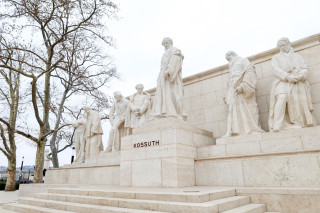
Lajos Kossuth, one of the most important figures in Hungarian history, was born in Monok in 1802. After completing his studies, he passed the bar exam in Pest in 1823 and worked as a lawyer between 1824 and 1832 in Zemplén County.
He was elected to the National Assembly in Bratislava in 1832 as a representative of remote orders. In his writings, he promoted the progress of the reform opposition and his battle to protect national interests. After the National Assembly was disbanded, he edited the Legislative Ledger in 1836 and 1837, but in 1837 the paper was banned and Kossuth was arrested and sentenced to four years in prison.
He was released in 1840. His writings denounced feudal privileges and demanded civil liberties for civilians and constitutional freedom for the nation. The main means he considered necessary to achieve his goals were the balancing of interests and political cooperation between the aristocracy and the people, and thus he took it upon himself to lead the aristocracy. To promote economic independence, he initiated the establishing of the Hungarian Trade Society and supported the protection of Hungarian goods by creating the Industrial Support Association in 1844.
In 1847, he was elected member of parliament to represent Pest County at the fall National Assembly, where he led the opposition.
On March 15, 1848 the revolution broke out, which soon turned into a fight for freedom with the aim of gaining independence from the Hapsburg Empire. Thanks to his influence, the National Assembly passed the laws that specified the revolutionary transformation and forced Vienna to concede. In Hungary’s first independent government, led by Lajos Batthyány, Kossuth was appointed Ministry of Finance. He is credited for creating independent Hungarian currency. With his speech of July 11, he managed to garner 200 thousand recruits and 42 million forints to defend the nation. At his recommendation, the National Assembly elected a National Defense Committee to organize the country’s defense.
After the Batthyány government resigned, the Defense Committee exercised executive power and Kossuth was elected its President. During the Revolution, he organized the military and provided for the economic, social, and political conditions for national resistance. It was at his initiative that the National Assembly proclaimed the dethronement of the House of Hapsburg in its Declaration of Independence issued in Debrecen on April 14, 1849. At the same time, Kossuth was elected governing president. In the final phases of the Revolution, he was unable to offset the deteriorating military situation caused by the intervention of the Russian army. On August 11, 1849, he handed over power to Artúr Görgey, who was later forced to capitulate.